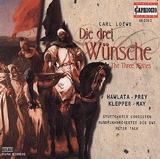|
|
|
|
|
|
|
|
| OPERA NEWS, June 1999 |
| JOHN BELL YOUNG |
|
|
LOEWE: Die Drei Wünsche
|
| Klepper, Weber, May; Kaufmann, F. Prey,
Worner, Hawlata; Stuttgarter Choristen; Rundfunkorchester des Südwestfunk,
Falk. German libretto only. Capriccio 50-074 (2) |
|
|
 Best
known for his copious catalogue of ballads and lieder, Carl Loewe
(1796-1869) demonstrated his consummate skill as an orchestrator and
impressive understanding of the voice in his 1834 opera Die Drei Wünsche
(The Three Wishes). Its woodwind-saturated lyricism pays homage to opera
while adhering to the more simplistic conventions of singspiel. Recitative
and spoken dialogue are abandoned in favor of Schubertian cavatinas and
reassuring choruses, and rhyming couplets in iambic pentameter are
frequently used. Strophic constructions prevail as well, but in the context
of the narrative forms in which Loewe's vocal music thrived, they are more
subtle than dogmatic. Although Die Drei Wünsche is occasionally reminiscent
of Fidelio -- the opening duets, for example, evoke the colloquy between
Marzelline and Jaquino -- it's hardly a slavish imitation, but rather an
honest aesthetic expression of its time. Best
known for his copious catalogue of ballads and lieder, Carl Loewe
(1796-1869) demonstrated his consummate skill as an orchestrator and
impressive understanding of the voice in his 1834 opera Die Drei Wünsche
(The Three Wishes). Its woodwind-saturated lyricism pays homage to opera
while adhering to the more simplistic conventions of singspiel. Recitative
and spoken dialogue are abandoned in favor of Schubertian cavatinas and
reassuring choruses, and rhyming couplets in iambic pentameter are
frequently used. Strophic constructions prevail as well, but in the context
of the narrative forms in which Loewe's vocal music thrived, they are more
subtle than dogmatic. Although Die Drei Wünsche is occasionally reminiscent
of Fidelio -- the opening duets, for example, evoke the colloquy between
Marzelline and Jaquino -- it's hardly a slavish imitation, but rather an
honest aesthetic expression of its time.
The plot -- an oriental fairy tale of two opposing merchant families, one
rich, one poor, at the mercy of an itinerant Dervish who can't make up his
mind -- is another matter. The invention of one Ernst Raupach, a friend of
Loewe's whose principal occupation was that of an Imperial Russian Privy
Councillor, the story of Die Drei Wünsche is so vapid that it makes
Cenerentola look like Wozzeck.
Peter Falk's urbane, persuasive conducting supports a fine cast of young
singers that includes an effective, studious performance of the Dervish
Bathmendi by Franz Hawlata, a bass-baritone whose musicianship makes up for
a somewhat strained breathiness in his lower register. Florian Prey (son of
the great Hermann) and fellow baritone Frank Worner offer sturdy, focused
readings of the merchants Muley and Zadig, though Worner's wide vibrato
occasionally compromises simple declamation. Regina Klepper's bright,
birdlike soprano is ideally suited to Suleima, but she tends toward
stridency when compelled to sing on long breaths. Mezzo Hermine May and
soprano Astrid Weber deliver solidly as rivals Aischra and Fatme.
There's gold in this recording in the magnificent lyric tenor Jonas
Kaufmann, who sounds eerily like Fritz Wunderlich and has the musical
instincts and brains to match. Like Wunderlich, Kaufmann is a compellingly
intense singer who pays attention to inflection and motivic articulation in
the context of a cumulative, goal-oriented rhythm. He navigates the
elaborate fioriture of his Act III cavatina ("Philosophie oder liebe") with
uncommon ease, impeccable legato and a clarion yet full-bodied sonority
richly supported in every register. I look forward to hearing much more from
this singer, whose contribution here makes having this set all the more
worthwhile. |
|
|
|
|
|
|
|
|
|
|
|
|
|
|